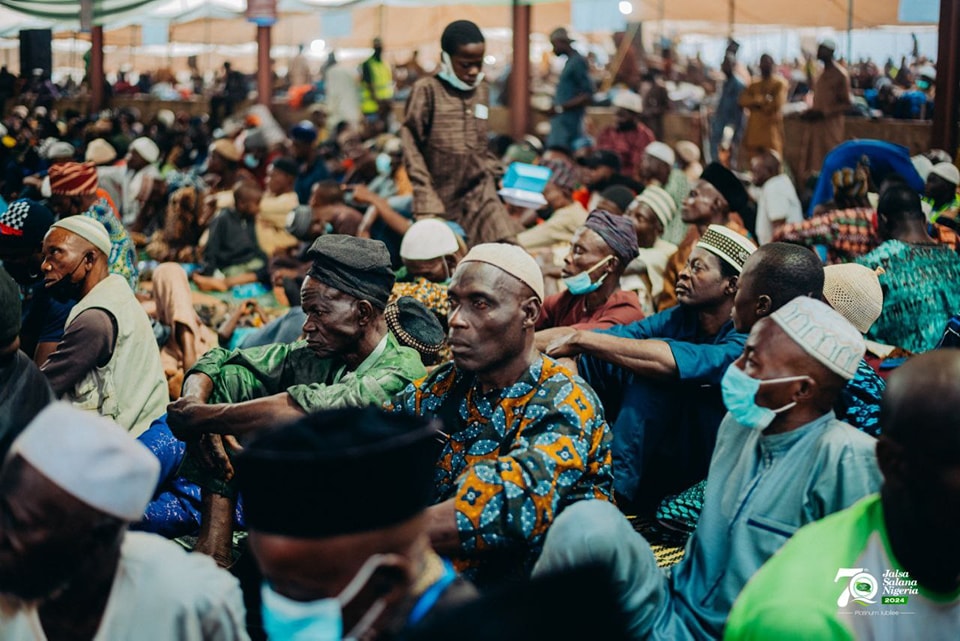By Fadlul-Munim Ariyo Kehinde
Jalsa Salana is a hallmark of the Ahmadiyya Muslim Community, initiated by the Promised Messiah, Hazrat Mirza Ghulam Ahmad (as). It is a gathering for spiritual growth, Islamic brotherhood, and the reinforcement of the Nizam of the Jamaat while strengthening Islamic values. At the heart of Jalsa Salana lies the spirit of giving and receiving.
The Spiritual Foundation of Giving and Receiving
The Holy Quran emphasizes the virtues of giving from what we have been provided and serving others through our lives, wealth, knowledge, and honor. Allah states:
وَيُؤْثِرُونَ عَلَىٰ أَنفُسِهِمْ وَلَوْ كَانَ بِهِمْ خَصَاصَةٌ
“They give preference to others over themselves, even though they are in need.”
(Surah Al-Hashr, 59:9)
This verse highlights the importance of selflessness in fostering brotherhood. Jalsa Salana encourages participants to embody this principle by prioritizing the comfort and needs of others.
Our Holy Master, Prophet Muhammad (ﷺ), said:
لَا يُؤْمِنُ أَحَدُكُمْ حَتَّىٰ يُحِبَّ لِأَخِيهِ مَا يُحِبُّ لِنَفْسِهِ
“None of you truly believes until he loves for his brother what he loves for himself.”
(Sahih Bukhari 13; Sahih Muslim 45)
This Hadith reminds us that Islam is rooted in mutual care and generosity. Jalsa Salana provides an opportunity to practice this teaching by extending hospitality, kindness, and assistance to others.
The Promised Messiah (as) also emphasized selfless service and mutual support:
“The essence of Islam is to serve humanity and to care for the weak and needy with true compassion and sincerity.”
He further stated that the Jalsa Salana gathering is an avenue to establish unity and strengthen ties of brotherhood:
“The primary objective of this convention is to enable every sincere individual to personally experience religious benefits… and to broaden their circle of brotherhood.”
Building a Strong Sense of Community at Jalsa Salana
Offering Service
- Volunteering: Participants engage in various sectors such as security, food distribution, toilet cleaning, registration, logistics, or guiding attendees.
- Hospitality: Khalifatul Masih V (atba) frequently emphasizes the importance of hospitality in his sermons. Each attendee should warmly welcome guests, ensuring they feel valued and comfortable.
Huzur (atba) said: “In serving the guests of Jalsa, regard them as the guests of the Promised Messiah (as). Serve them, recognizing that they have come here for a noble purpose out of devotion to Allah. Exhibit the highest standard of morality.”
This was mentioned during the Friday sermon at Jalsa Salana UK 2024. - Sharing Knowledge: Engage in meaningful conversations and share insights from Jalsa proceedings to enhance collective understanding.
- Listening to Others: Show respect and attentiveness during conversations and speeches, as receiving knowledge is an act of gratitude.
The Role of Humility in Giving and Receiving
The Holy Quran states:
إِنَّمَا نُطْعِمُكُمْ لِوَجْهِ اللَّهِ لَا نُرِيدُ مِنكُمْ جَزَاءً وَلَا شُكُورًا
“We feed you only for the sake of Allah; we desire neither reward nor thanks from you.”
(Surah Al-Insan, 76:9)
This verse captures the essence of humility in service. Giving and receiving at Jalsa Salana should be driven by the desire to please Allah, not by the pursuit of recognition or reward. Every good deed performed during Jalsa is a form of worship, with the reward coming solely from Allah.
The Holy Prophet Muhammad (ﷺ) exemplified humility in giving and receiving. He personally served his guests, distributed wealth to the needy, and expressed gratitude for even the smallest acts of kindness.
Similarly, his Sahabah set a precedent for selflessness. During the migration to Madinah, the Ansar (Muslims of Madinah) accommodated the Muhajirun (Muslims from Makkah), sharing their homes, wealth, and resources. This act reflects the principles guiding interactions at Jalsa Salana.
A narration by Munshi Zafar Ahmad Sahib (ra) highlights the Promised Messiah’s (as) selflessness during Jalsa:
“Once, at the time of Jalsa, finances had run out. In those days, there was no scheme to collect funds for Jalsa; instead, the Promised Messiah (as) covered the expenses personally. Mir Nasir Nawab Sahib reported the lack of food for guests. The Promised Messiah (as) instructed him to ask his wife for any spare jewelry. The jewelry was sold, and the proceeds were used to feed the guests.”
This story exemplifies the spirit of sacrifice and giving demonstrated by the Promised Messiah (as) and his wife.
Fostering Unity Amid Diversity
Jalsa Salana brings together people from diverse backgrounds. In Nigeria, for example, attendees come from various ethnic and moral groups. While differences in reasoning may arise, tolerance and resilience foster a community united by love and compassion.
Conclusion: A Legacy of Brotherhood
Jalsa Salana is more than an event; it is a spiritual retreat where participants practice the pure teachings of Islam. By giving generously and receiving graciously, attendees build a strong sense of community that transcends race, language, and culture.
Let us remember the words of the Promised Messiah (as):
“True love for Allah requires that we love His creation and serve them selflessly.”
By embodying this principle at Jalsa Salana, we foster unity, compassion, and spiritual growth, leaving a lasting impact on all who attend.


